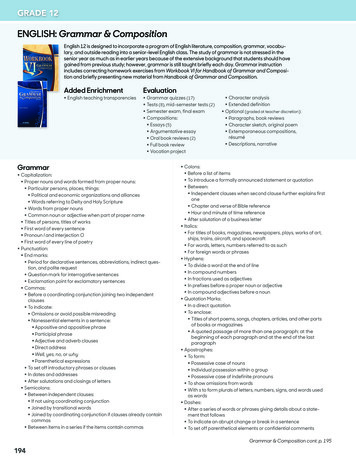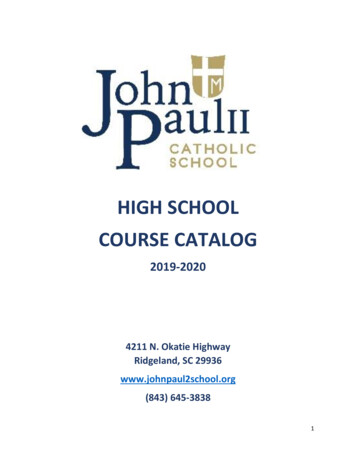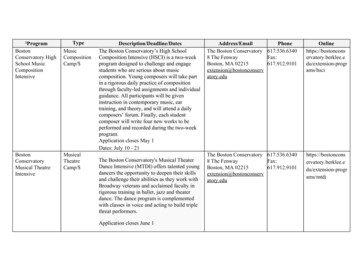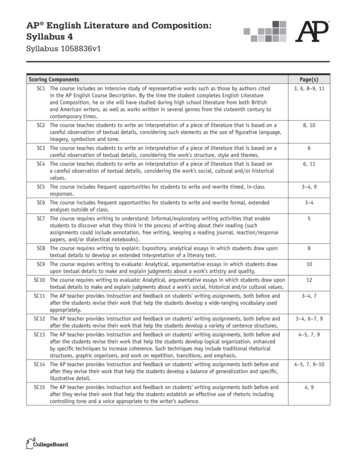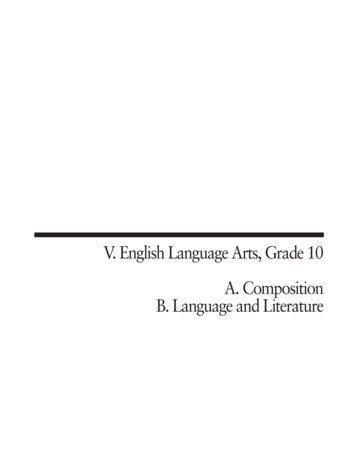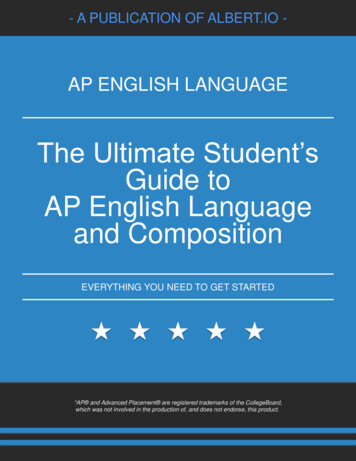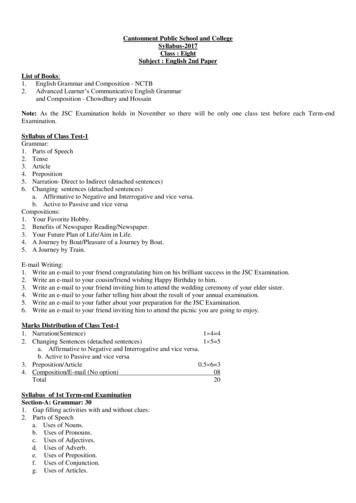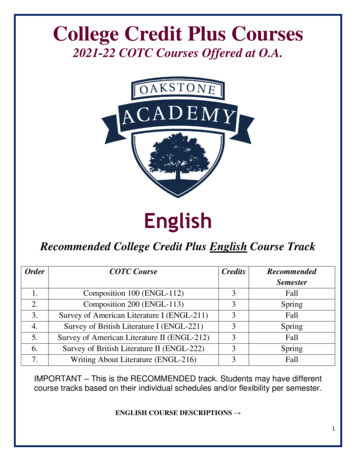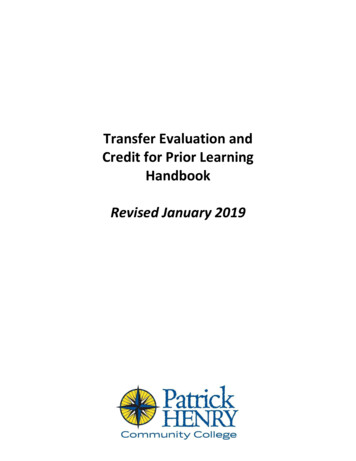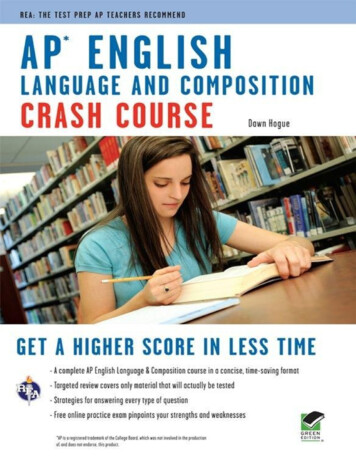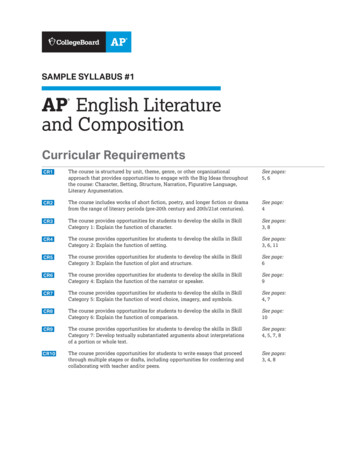
Transcription
SAMPLE SYLLABUS #1AP English Literatureand Composition Curricular RequirementsCR1The course is structured by unit, theme, genre, or other organizationalapproach that provides opportunities to engage with the Big Ideas throughoutthe course: Character, Setting, Structure, Narration, Figurative Language,Literary Argumentation.See pages:5, 6CR2The course includes works of short fiction, poetry, and longer fiction or dramafrom the range of literary periods (pre-20th century and 20th/21st centuries).See page:4CR3The course provides opportunities for students to develop the skills in SkillCategory 1: Explain the function of character.See pages:3, 8CR4The course provides opportunities for students to develop the skills in SkillCategory 2: Explain the function of setting.See pages:3, 6, 11CR5The course provides opportunities for students to develop the skills in SkillCategory 3: Explain the function of plot and structure.See page:6CR6The course provides opportunities for students to develop the skills in SkillCategory 4: Explain the function of the narrator or speaker.See page:9CR7The course provides opportunities for students to develop the skills in SkillCategory 5: Explain the function of word choice, imagery, and symbols.See pages:4, 7CR8The course provides opportunities for students to develop the skills in SkillCategory 6: Explain the function of comparison.See page:10CR9The course provides opportunities for students to develop the skills in SkillCategory 7: Develop textually substantiated arguments about interpretationsof a portion or whole text.See pages:4, 5, 7, 8CR10The course provides opportunities for students to write essays that proceedthrough multiple stages or drafts, including opportunities for conferring andcollaborating with teacher and/or peers.See pages:3, 4, 8
Advanced PlacementEnglish Literature andComposition Sample Syllabus #1Course OverviewThe AP English Literature and Composition course is designed and taught thematicallywith an emphasis on core readings along with modern and contemporary selections thatilluminate and expand upon a variety of themes. AP English Literature and Compositionclosely follows the requirements described in the AP English Literature and CompositionCourse and Exam Description (CED), including the fundamentals of literary analysisand introductory college composition. Each week students discuss and engage in avariety of writing activities focusing on argumentation, interpretation, analysis, rhetoricalstrategies, exposition, structure, and style. Students read and study a variety of novels,plays, poems, and short stories from the 16th century to the present. In addition to districtapproved novels, students read shorter works and drama from Prentice Hall Literature: TheBritish Tradition Perrine’s Literature: Structure, Sound, & Sense. The course focuses on theexperience of literature, the interpretation of literature, the evaluation of literature, andwriting to develop stylistic maturity and sophistication. Students practice their writingvia numerous timed essays, which are revised several times, as well as longer essays thatrequire outside research and MLA formatting. Students also practice oral communicationskills, through poetry presentations, regular classroom discussions and acting asdiscussion facilitators.Student PracticeThroughout each unit, Topic Questions from AP Classroom will be provided to helpstudents check their understanding. The Topic Questions are especially useful forconfirming understanding of difficult or foundational topics before moving on to newcontent or skills that build upon prior topics. Topic Questions can be assigned before,during, or after a lesson, and as in-class work or homework. Students will get rationalesfor each Topic Question that will help them understand why an answer is correct orincorrect, and their results will reveal misunderstandings to help them target the contentand skills needed for additional practice.At the end of each unit or at key points within a unit, Personal Progress Checks willbe provided in class or as homework assignments in AP Classroom. Students will get apersonal report with feedback on every topic, skill, and question that they can use to charttheir progress, and their results will come with rationales that explain every question’sanswer. One to two class periods are set aside to re-teach skills based on the results of thePersonal Progress Checks.Writing ObligationsIn-class writing: Timed writing assignments are given approximately every two to threeweeks. Topics usually arise from the readings and relate to questions of character, setting,structure, narration, figurative language, and literary analysis. Sometimes, these focus onworks not previously studied in class, such as those found on the AP poetry and prosequestion prompts.Essays: Student essays are two to four pages in length. All essays prepared outside ofclass must be typed. Students are expected to submit their thesis statements two weeksprior to the due date. Thesis statements are based on student choices of any of theAP-Course Audit Teacher Resources 2020 College Board2
Advanced Placement English Literature and Composition Sample Syllabus #1literature studied within the marking period. This critical essay challenges the student todevelop a sophisticated literary argument about a selected work. The student may focuson a thematic topic, but the essay should also emphasize the effect of one to two literaryelements and techniques. A first draft is typically due one week prior to the due date.Drafts are returned with suggestions and comments that are expected to be incorporatedin the final draft. Individual writing conferences will be arranged on a case-by-case basis.Essays are evaluated on their strength of argument, depth of literary analysis, originalityof thought, style, and mechanics.Essay Revisions: Students submit drafts to the instructor on a regular basis, as well asparticipate in peer revision and editing reviews. Longer essays are revised at least once,and Essay #2 must be revised at least twice. Students may schedule revision conferenceswith the instructor at any time. CR10Literature Reviews: For each novel and drama studied in the course, students mustcomplete a review sheet. This review sheet requires that students write on the followingtopics: main characters, minor characters, main settings, plot, two symbols and references,style, author’s dominant philosophy, and four quotations that are representative of thework as a whole. CR3 CR4 These reviews are valuable in preparing students for inclass writing and exams, as well as for the AP English Literature and Composition examin May. Literature Review sheets are due on the reading completion date of each work.(Credit or no credit)Quizzes: There are approximately five unannounced reading quizzes per semester.Midterm Exams: Students take midterm exams at the end of quarters 1 and 3. Theseexams consist of timed essay responses. As with all timed essays, scoring will be basedon the AP English Literature and Composition six-point rubric for the relevant freeresponse question. Students will practice using these rubrics to score sample essays, aswell their own and peers’ essays.Final Exams: Students take final exams at the end of quarters 2 and 4. These examsconsist of timed essay responses with some multiple-choice questions from theAP Classroom Question Bank.Oral ObligationsCR10The syllabus must providea description of at leastone essay assignment thatrequires more than onedraft and includes evidenceof collaboration with andfeedback from teachersand/or peers.CR3The syllabus must includeat least one description ofan instructional activity,series of activities, orproject in which studentsexplain the function ofcharacter in a text.CR4The syllabus must includeat least one description ofan instructional activity,series of activities, orproject in which studentsexplain the function ofsetting in a text.Presentation: Students lead one formal class discussion during the year following amodified Socratic Seminar format. Students present/facilitate a literature discussionon a work that the class has been reading in the course. The instructor presents a listof reading assignments at the beginning of the year, and students will sign up for afacilitation date.The student’s primary goal is to orchestrate a rich, fruitful discussion. Students read theselection and then create thought-provoking questions or “talking points” to guide, nurture,and stimulate what in rural Ireland is called “craic,” or “a good chat,” one of the mostvalued of all social skills. Students turn in a typed outline of their discussion plan andquestions prior to the presentation. Being a discussion leader does not mean one has to bea class expert on the selection or guide students to a particular interpretation. Rather, thefacilitator’s role will be to ask questions and follow-up questions, bring up troubling issues,keep the conversation going, and generally ignite and extend sophisticated thinking.Students are evaluated on their preparation, ability to engage the class, quality ofquestioning techniques, and appropriate use of the time requirement (45 minutes).Poetry Recitations: Students memorize 40 lines of poetry once each semester and providea brief synopsis of the poem, including an explanation of how the poem’s structurecontributes to the development and relationship of ideas in the poem prior to theirrecitation. Poetry recitations are staggered throughout the course and students sign up forrecitation dates.AP-Course Audit Teacher Resources 2020 College Board3
Advanced Placement English Literature and Composition Sample Syllabus #1Other Requirements: These include participation in class discussions, two summerreading texts (which may be a combination of a novel, short stories, and/or a drama)and accompanying assignments, and a summer Biblical allusion assignment. Summerassignments are due upon entering the class on the first day.Class discussions are conducted in the Socratic Seminar format. Students are expectedto regularly contribute their thoughts and impressions of writing and literature.We write. A lot. Students engage in the writing process through writing thesis statements,paragraphs, and full-length essays that incorporate textual evidence and commentary.Students have multiple opportunities to revise their writing. CR9 CR10We frequently score student samples from previous AP English Literature andComposition exams using the six-point rubrics. We review and discuss the rubrics, andstudents score essays individually and in groups. In addition, students are required tolocate model sentences that demonstrate the accurate use of literary terms, effects ofterms, supporting quotations, and overall sophistication. Students are also requiredto locate sentences in their own essays that require revision and use the high-scoringsample essays as models for revisions. We also use these samples in conjunction with thestudents’ own writing to improve writing technique, vocabulary development, variety ofsentence structure, use of transitions, and effective organization.We use Nancy Dean’s Voice Lessons on a regular basis at the beginning of class toinformally write about elements such as diction, tone, syntax, use of detail, voice, andimagery. CR7 Students work on these assignments individually, in small groups, and asa class.Practice multiple-choice questions from both the PPCs and Question Bank on APClassroom are given regularly especially as we get closer to the AP English Literature andComposition exam in May.Required Texts and Materials:In AP English Literature and Composition, I recommend that students purchase their ownnovels so that they may write in their books as we probe and analyze them. Kindle editionsare considered but must receive instructor approval prior to use. The school library checksout novels to all students who require them. If using school editions, students need tokeep sticky notes in the texts for regular annotation during reading.Preliminary list of novels, dramas, and texts:Native Son, WrightCR9The syllabus must includeat least three activities(including two essays)in which students developtextually substantiatedarguments aboutinterpretations of a portionor whole text.CR7The syllabus must includeat least one description ofan instructional activity,series of activities, orproject in which studentsexplain the function ofword choice, imagery, orsymbols in a text.CR2The syllabus must includethe titles and authors ofthe works of short fiction,poetry, and longer fiction ordrama studied in the coursefrom the range of literaryperiods (pre-20th centuryand 20th/21st centuries).CR2Macbeth, ShakespeareFrankenstein, ShelleySummer Reading:The Catcher in the Rye, SalingerThe Glass Menagerie, Tennessee WilliamsAnthologies:Perrine’s Literature: Structure, Sound, & SensePrentice Hall Literature: The British TraditionShort stories will include the following among others:“The Necklace,” Guy de Maupassant; “The Pardoner’s Tale” from The Canterbury Tales,Chaucer; “Interpreter of Maladies,” Lahiri; “Desiree’s Baby,” Chopin; “Where Are YouGoing, Where Have you Been?” Oates; “The Under Graham Railroad Box Car Set” fromFive-Carat Soul, McBride; “Geese,” Packer; “Battle Royal,” Ellison; “A Good Man is Hard toFind,” O’Connor; “The Tell-Tale Heart,” PoeAP-Course Audit Teacher Resources 2020 College Board4
Advanced Placement English Literature and Composition Sample Syllabus #1Poetry selections will include the following among others:“That Time of Year,” Shakespeare; “Do Not Go Gentle Into That Good Night,” Thomas;“The Man He Killed,” Hardy; “Dulce et Decorum Est,” Owen; “Crossing the Bar,”Tennyson; Psalms; “Out, Out –“ Frost; “The Author to Her Book,” Bradstreet; “ParadiseLost” (excerpts), Milton; “Convergence of the Twain,” Hardy; “The Chimney Sweeper”(1789) and “The Chimney Sweeper” (1793), Blake; “Much Madness is Divinest Sense,”Dickenson; “Those Winter Sundays,” Hayden; “On Her Loving Two Equally,” Behn;“Digging,” Heaney; “For Julia, In the Deep Water,” Morris; “To a Daughter LeavingHome,” Pastan; “My Last Duchess,” BrowningNote: In addition to the works studied in AP English Literature and Composition, worksfrom a broader range of time periods are studied in prerequisite courses.Course Planner/Student ActivitiesQUARTER #1 THEME: ILLUSION VS. REALITYUnit CR1SkillsWeek 1SummerReadingReviewWeeks 2–4Unit 1: ShortFiction I(10 periods)ReadingsExamples of InstructionalActivitiesThe Catcherin the Rye,Salinger Students complete LiteratureThe ssant“ThePardoner’sTale” from TheCanterburyTales, ChaucerReview sheets for both works. Assessment: Students respondto an essay prompt that asksthem to compare and contrastHolden Caulfield and PhoebeCaufield and to discuss howthis comparison or contrastcontributes to an interpretationof the work as a whole.CR1The syllabus must includean outline of course contentby unit, theme, genre,or other organizationalapproach that alsodemonstrates the inclusionof the big ideas. The bigideas must be explicitlystated in the syllabus. In groups of three, studentscreate one graphic organizer for“The Necklace” and one graphicorganizer for “The Pardoner’sTale.” One organizer includestextual details about a character,the character’s perspective, andthe character’s motives. The otherorganizer includes textual detailsthat reveal the setting. Practice: Complete PersonalProgress Check MCQ for Unit 1. Practice: Complete PersonalProgress Check FRQ for Unit 1. Assessment: Using the graphicorganizer about a character forreference, students develop andrevise a paragraph that asserts aclaim about a character from oneof the stories and supports thatclaim with details from the textas evidence. CR9 Assessment: Using the graphicorganizer about setting forreference, students develop andrevise a paragraph that assertsa claim about the setting andsupports that claim with detailsfrom the text as evidence. CR9AP-Course Audit Teacher Resources 2020 College Board5
Advanced Placement English Literature and Composition Sample Syllabus #1Unit CR1SkillsReadingsExamples of InstructionalActivitiesWeeks 5–7CharacterCHR-1.A“That Timeof Year,”Shakespeare Chunking the Text: StudentsUnit 2:Poetry I(10 �Do Not GoGentle IntoThat GoodNight,”Thomas“The Man HeKilled,” Hardy“Dulce etDecorumEst,” Owen“Crossing theBar,” Tennysonread the Dylan Thomas villanelle“Do Not Go Gentle Into ThatGood Night.” Analyzing thepoem’s structure, students notethe arrangement and internalcomposition of the poem’sstanzas. Noting that the poem isdivided into five 3-line stanzasand concludes with one 4-linestanza, students read andparaphrase each of the stanzas.In groups of three, students thencompare observations. Theythen engage in a whole groupdiscussion exploring how eachstanza conveys meaning on itsown but also relates to the stanzathat comes before and after it.CR5 Practice: Complete PersonalProgress Check MCQ for Unit 2. Practice: Complete PersonalProgress Check FRQ for Unit 2. Assessment: Students write atimed in-class essay in responseto a past AP Poetry Analysisprompt.CR5The syllabus must includeat least one description ofan instructional activity,series of activities, orproject in which studentsexplain the function of plotand structure in a text. Note: The topic of Essay #1 isdue at the end of Week 5. Acomplete draft of the essay is dueWeek 7.Weeks 7–10Unit 3:LongerFiction orDrama I(17 7.BLAN-7.CLAN-7.DLAN-7.ENative Son,Wright In-class writing: Students writea brief response to the followingprompt. It has been said thatwe are what we see—we are allproducts of our surroundings.Consider Bigger Thomas’ssurroundings in Richard Wright’sNative Son. In a well-writtenessay, analyze how Bigger’scomplex relationship with hisenvironment contributes to aninterpretation of the work as awhole. CR4 Practice: Complete PersonalProgress Check MCQ for Unit 3. Practice: Complete PersonalProgress Check FRQ for Unit 3. Students engage in the revisionprocess through individual andpeer editing of Essay #1. Assessment: Essay #1 dueCR4The syllabus must includeat least one description ofan instructional activity,series of activities, orproject in which studentsexplain the function ofsetting.Week 9. Note: The outside book choice isdue Week 10. Assessment: The midterm examis scheduled for Week 10.AP-Course Audit Teacher Resources 2020 College Board6
Advanced Placement English Literature and Composition Sample Syllabus #1QUARTER #2 THEME: FATE AND FREE WILLUnitSkillsReadingsExamples of InstructionalActivitiesWeeks f Maladies,”Lahiri Save the Last Word: StudentsUnit 4: ShortFiction II(17 ” Chopin“Where AreYou Going,Where HaveYou Been?”Oates“The UnderGrahamRailroad BoxCar Set” fromFive-CaratSoul, McBridesilently read “Desiree’s Baby,”focusing on the narrator. As theyread, students list quotationsthat resonate with them on fivenotecards. On the back of eachquotation card, students writethe reason for their choice.Students then form groups offour. One student reads thequotation while group membersdiscuss the relevance of thequotation, paying particularattention to diction, details,and syntax that reveal narrativeperspective. The quotation“owner” then speaks or “has thelast word” about the relevanceof the quotation. Studentsrotate sharing all of the groupquotations in the same fashion. Assessment: Students writeindividual paragraphs identifyingthe point of view and explainingits function in the story. Theymust provide one of their chosenquotations as evidence. CR9 Practice: Complete PersonalProgress Check MCQ for Unit 4. Practice: Complete PersonalProgress Check FRQ for Unit 4. Note: The topic for Essay #2is due at the end of Week 2. Acomplete draft is due at the endof Week 4.Weeks 5–9Unit 5:Poetry II(17 ationLAN-7.BLAN-7.CLAN-7.DLAN-7.EPsalms Practice: Complete Personal“Out, Out—,”Frost Practice: Complete Personal“The Authorto Her Book,”Bradstreet“Convergenceof the Twain,”Hardy“The ChimneySweeper”(1789) and“The ChimneySweeper”(1793), Blake“MuchMadnessis DivinestSense,”DickinsonProgress Check MCQ for Unit 5.Progress Check FRQ for Unit 5. In-class writing: Students readThomas Hardy’s “Convergence ofthe Twain” and write a responseto the poem that exploreshow the diction, imagery, andsymbolism contribute to thepoem’s complexity of meaning. In groups of three, students sharewhat they noticed about how theliterary elements and techniquesfunction in the poem and howthey approached writing aboutthe poem. CR7 CR9 Note: A second draft of Essay #2is due Week 7. Assessment: Essay #2 is dueWeek 8. Assessment: The final exam isscheduled for Week 9.AP-Course Audit Teacher Resources 2020 College Board7
Advanced Placement English Literature and Composition Sample Syllabus #1QUARTER #3 THEME: GOOD AND EVILUnitSkillsReadingsExamples of InstructionalActivitiesWeeks elley Practice: Complete PersonalUnit 6:LongerFiction orDrama II(17 ntationLAN-7.BLAN-7.CLAN-7.DLAN-7.EProgress Check MCQ for Unit 6. Practice: Complete PersonalProgress Check FRQ for Unit 6. In-class writing: Using MaryShelley’s Frankenstein, studentswrite a claim arguing that eitherVictor or the Creature is thevillain of the novel. Studentsdevelop their thesis statementto include their claim as well asa clause or phrase that analyzeshow the complex nature of thecharacter’s villainy contributes toan interpretation of the work as awhole. Students, then, completein class a first draft of an essayusing the newly drafted thesisand revise it over the course ofseveral class periods. CR3CR9 Assessment: The final draft ofthe Frankenstein essay will beevaluated using the six-pointrubric. Students are required tosubmit the rough draft of theiressay along with the final draft todemonstrate their revision work.Additional teacher feedbackwill focus on the quality of thethesis statement and selectedevidence, the depth of analysis,and the strength of connectionamong the evidence, analysis,and overall argument. CR9CR10 Note: The topic for Essay #3 isdue Week 3.AP-Course Audit Teacher Resources 2020 College Board8
Advanced Placement English Literature and Composition Sample Syllabus #1UnitSkillsReadingsExamples of InstructionalActivitiesWeeks 5–8CharacterCHR-1.BCHR-1.D“Geese,”Packer Students will read a printedUnit 7: ShortFiction III(17 AN-7.D“Battle Royal,”Ellison“A Good Man isHard to Find,”O’Connor“The Tell-TaleHeart,” Poeversion of “The Tell-Tale Heart”that is presented as a doubleentry journal. As studentsprogress through the story, theywrite questions and notes in theright column keeping in mindnarrator reliability, characterdevelopment, detail, andimagery. CR6 Students then complete acharacter motivation graphicorganizer in which they providetextual details as evidenceto support two differentperspectives: the narrator isinsane, and the narrator is acold-blooded killer.CR6The syllabus must includeat least one description ofan instructional activity,series of activities, orproject in which studentsexplain the function of thenarrator or speaker. In-class writing: Studentswrite an essay in response tothe following prompt. Aftercompleting your close reading ofEdgar Allan Poe’s “The Tell-TaleHeart,” write an essay in whichyou analyze the perspective ofthe narrator and discuss howthe complex perspective ofthe narrator contributes to aninterpretation of the work as awhole. CR6 Practice: Complete PersonalProgress Check MCQ for Unit 7. Practice: Complete PersonalProgress Check FRQ for Unit 7. Note: A complete draft of Essay#3 is due Week 6. Assessment: The final draft ofEssay #3 is due Week 8.AP-Course Audit Teacher Resources 2020 College Board9
Advanced Placement English Literature and Composition Sample Syllabus #1UnitSkillsReadingsExamples of InstructionalActivitiesWeek 9StructureSTR-3.CSTR-3.D“Paradise Lost”(excerpts),Milton Students engage in close readingUnit 8:Poetry III(17 periods tobe continuedinto IG-6.Dactivities with the excerptsfrom Milton’s “Paradise Lost”presented in the Prentice Halltext. Students begin reviewing andpreparing for the AP EnglishLiterature and CLAN-7.DLAN-7.E Note: The outside book choicefor Quarter #4 is due this week. Assessment: The midterm examis scheduled for this week. Instructional activities, studentpractice, and assessmentscontinue in Quarter 4.QUARTER #4 THEME: MARRIAGE AND FAMILY RELATIONSHIPSUnitSkillsReadingsExamples of InstructionalActivitiesWeeks 1–4StructureSTR-3.CSTR-3.D“Those WinterSundays,”Hayden I Do, You Do, We Do: D“On HerLoving TwoEqually,” BehnUnit 8: PoetryIII (continued)(17 N-7.DLAN-7.E“Digging,”Heaney“For Julia,In the DeepWater,” Morris“To a DaughterLeavingHome,” Pastan“My LastDuchess,”Browningstudents read Seamus Heaney’spoem “Digging,” studentsidentify one simile or metaphoras a class. We discuss howthe two objects are compared,and students are directedto pay close attention to theobjects’ specific traits that arecompared. Following a teacherled discussion on how thecomparison conveys meaning,students in pairs choose anothersimile or metaphor in the poem.The pairs then discuss how thetwo objects are compared andwork together to explain how thecomparison conveys meaning.CR8 In-class writing: Students writean introductory paragraph thatincludes a defensible thesisstatement about how the selectedsimile or metaphor in Heaney’s“Digging” develops the complexrelationship between the speakerand his progenitors. Practice: Complete PersonalProgress Check MCQ for Unit 8. Practice: Complete PersonalProgress Check FRQ for Unit 8. Students continue to prepare forthe AP English Literature andComposition exam. Note: The topic for Essay #4 isdue Week 2.AP-Course Audit Teacher Resources 2020 College Board10
Advanced Placement English Literature and Composition Sample Syllabus #1UnitSkillsReadingsExamples of InstructionalActivitiesWeeks 4–7CharacterCHR-1.BCHR-1.EMacbeth,Shakespeare In-class writing: FollowingUnit 9:LongerFiction orDrama III(17 eraryArgumentationLAN-7.BLAN-7.CLAN-7.Dvarious close reading activitiesin our study of Macbeth, studentswrite an essay in response tothe following prompt. Considerthe following quote from EudoraWelty: “Fiction depends forits life on place. Place is thecrossroads of circumstance,the proving ground of, whathappened? Who’s here? Who’scoming?” In a well-writtenessay, analyze how the complexrelationship between settingand plot contributes to aninterpretation of Macbeth asa whole. This essay will beevaluated using the AP Literatureand Composition six-pointrubric. CR4 Practice: Complete PersonalProgress Check MCQ for Unit 9. Practice: Complete PersonalProgress Check FRQ for Unit 9. The AP English Literatureand Composition exam isadministered in Week 5. Note: The draft of Essay #4 isdue Week 6.Weeks 8–10End-of-YearAssignmentsand FinalExam Assessment: Essay #4 is dueWeek 9. Assessment: Senior ProjectPresentation Assessment: The final exam isscheduled for Week 10. Senior Graduation Speeches Senior WeekAP-Course Audit Teacher Resources 2020 College Board11
Composition Sample Syllabus #1 Course Overview The AP English Literature and Composition course is designed and taught thematically with an emphasis on core readings along with modern and contemporary selections that illuminate and expand upon a variety of themes. AP English Literature and Composition
